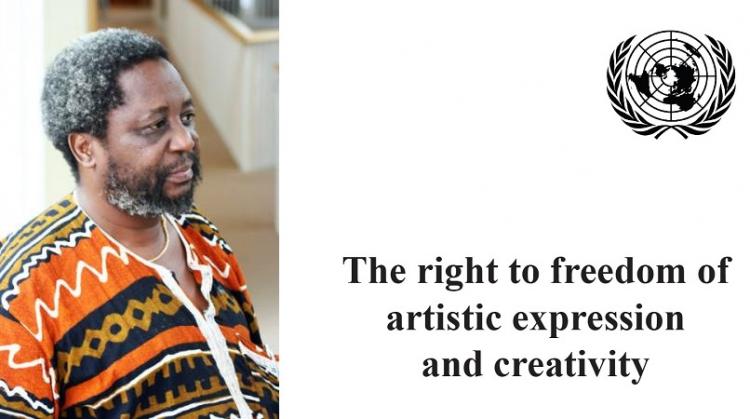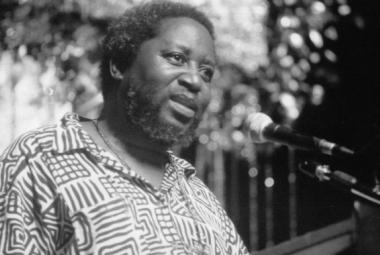Beautiful Words are Subversive
Beautiful Words are Subversive
By Chenjerai Hove
As a writer, I did not realize that I was banned from entering all government schools of my country until a high school teacher was dismissed for having invited me to his school. High school students nation-wide were studying my novel, Bones. My novel was allowed into schools, but the author (me) was banned. The reason: ‘You will poison the minds of the students,’ an official told me when I protested.
But then, if a writer poisons the minds of the students, what would the novel do since it is allowed into schools? Of course, the authorities feared that my interpretation of the novel would be poisonous. But if I were a frightened bureaucrat or minister of culture or education, I would fear more the book without any authorial interpretation, a free book in the hands of the students, than a book with some interpretation from the author.
Experience has taught me that the root of the conflict between writers and politicians is the space called constituency. Those who said the pen is mightier than the sword might have been materially mistaken, but in the end there are certain fundamental truths in this saying. Maybe the truth is that the pen, words, shoot at the heart, soul and imagination of the reader while the sword, an object of physical harm, only destroys the flesh. A writer’s words sooth the reader to change, a gun shoots the reader to death.
Since time immemorial new ideas about perceptions of the world have always been a danger to those whose comfort is viewed as permanent. Books, and all arts, contain ‘new’ ideas, and new ideas and visions are a danger to those whose constituencies are always measured in quantitative ways. Books change lives through ideas. Politics changes physical and human spaces quantitatively.
Artists never promise their audiences anything except the meaning of a full life. Politicians and others of the power trade promise heaven on earth. The former dwells in the constituency of mind and meaning, while the latter dwells in the constituency of figures and numbers. But when the politician seeks the constituency of mind, he/she finds that the artist has already settled permanently in that constituency.
The two constituencies have their different kinds of power. I cherish to have my words, my language, help shape the dreams and aspirations of those who read my work. My dream is to change the way they perceive the world, the way they feel towards objects and people, the way they feel towards the land they walk on, the way they experience ‘the other’ who comes from ‘other’ lands. I want my words to share the beauty and ugliness, the hopes which I still see in human beings.
If my endeavours offend anyone, it is because he/she hates sincerity and the human capacity to doubt, which is also the human capacity to transform. The moment we lose our capacity to doubt everything about our existence, we, as human beings, soon become extinct.
Artists seek the freedom to create, to see and record the joys, sorrows and smiles of their societies in order to celebrate and warn humanity about its flowers and human decay. I hate silence, society hates silence laws because human beings are not silent imbeciles.
© Chenjerai Hove, 2013
Find the whole essay in the attachment below
Chenjerai Hove
Chenjerai Hove (Mazvihwa, Zimbabwe, 1956) is a prominent poet, novelist, play writer, essayist and human rights activist. A vocal critic of the regime of Robert Mugabe, Hove was forced to flee Zimbabwe in 2001 and has, ever since, lived in exile in France, Norway and the USA. He currently lives and works in Stavanger, Norway, where he was an ICORN guest writer from 2005-2007.
Hove is the author of several noteworthy and award-winning works of fiction, poetry, and essays including his novels, Shadows and Bones, which won the Zimbabwe Literary Award and the Noma Award for Publishing In Africa. In 2001 Hove was awarded the German-Africa Prize for Freedom of Expression and Social Justice for his overall contribution to democracy and human rights in Africa through his writings in literature and journalism.
His first education in a local Catholic school, Hove later studied literature and education at the University of South Africa and the University of Zimbabwe. In 1981 Hove started working as an editor for Mambo Press and four years later became chief editor of the Zimbabwe Publishing House. From 1984 to 1992 he was the chairman of the Zimbabwe Writer’s Association, while working as a freelance journalist and writer in Harare.
Hove writes in English and in Shona –a Bantu language, native to the Shona people of Zimbabwe and southern Zambia. He published his first poems in Shona in 1978. In 1980 he contributed 14 poems in English to the anthology And Now the Poets Speak, which was published on the occasion of Zimbabwe’s independence. Up in Arms (1982) was his first lyric poetry volume, followed by Red Hills of Home (1985). These two books attracted the attention of the literary critics. His award-winning Bones has been translated into several foreign languages, giving to his author wide international recognition. Bones was followed by Shadows in 1994 and Ancestors in 1996.
Hove’s style innovates the European narrative genre as he introduces in his works the oral narrative tradition predominant in Africa. His novels offer a fresh look into his country, like chronicles that consciously defy and cross the boundaries between past, present and future, just as he does with those between the living and the dead.
A fervent advocate of ICORN, the “International Cities of Refuge Network,” he has participated in many events and activities aimed at stretching the network.
Writers
Latest news
-
08.03.24
-
28.02.24
-
20.02.24
-
16.02.24
-
09.02.24








